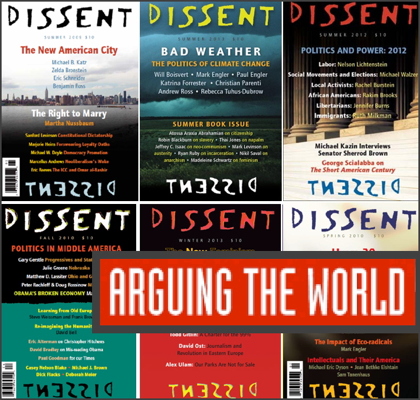A dispatch for the “Arguing the World” blog at Dissent magazine.
Published in Dissent.
When it comes to columnists at the New York Times, there’s plenty to complain about. I’ve recently written in frustration at Nicholas Kristof’s boneheaded paean to the economics profession and in disgust at several aspects of David Brooks’ journalistic output. Fellow Dissent contributor Lindsay Beyerstein questioned Frank Bruni’s qualifications last week after the columnist’s inane piece touting his ignorance of Harry Potter. And don’t get me started on Thomas Friedman.
Given all the negativity, I thought I’d take a moment to register a relatively positive sentiment: I’ve been pleased to see Joe Nocera land some solid columns over the past several months.
Nocera’s not a new face at the Times. He’s been writing a column for the Saturday business section since 2005. But, following Frank Rich’s resignation in March, Nocera was promoted to the main op-ed page—a significant rise in visibility. I’d say he’s stepped up pretty nicely.
Nocera’s no radical, and I disagree with him often enough. (He supports hydraulic fracking in the Marcellus Shale, for one. And, even in rejecting it, I think he was unduly kind to Paul Ryan’s Medicare plan.) That said, he’s followed Wall Street for a long time, knows the players, and is not in awe of them. (Warren Buffett take note.) He believes in government regulation of the banking industry, and—notwithstanding having the kind of long experience that would breed thorough cynicism in many—he still gets pissed off when he sees watchdog agencies in bed with the executives they’re supposed to oversee and watches white-collar criminals avoid justice.
Some noteworthy columns that come to mind from the past few months include a piece encouraging Obama to fight for Elizabeth Warren:
“Yes, the nomination would spark a partisan fight, and, yes, there is a high likelihood that she would not win confirmation. But it would redound nicely to the president’s advantage. Americans would be able to see, in the starkest way imaginable, who’s trying to help them—and who’s not.”
That was good advice, not taken.
Nocera also offered an interesting, compact history of the 1933 Glass-Steagall act—the Depression-era law that separated commercial and investment banks, the Clinton-era repeal of which helped spur the recent economic crisis. He opened his column with a passage about businesses crying wolf way back then:
“The president of the American Bankers Association was railing against excessive regulation in a speech at the Waldorf Astoria. The banking reform bill, he complained, “would destroy a substantial part of our bond-distributing machinery.” He added, “Can anyone expect that a step of this kind will improve the quality of our long-term investments?“”
Business protests aside, the regulations did improve the long-term economic health of the country. Nocera notes: “although the modern reform bill, Dodd-Frank, surely does some good, it’s not even comparable.”
Finally, the columnist made a nice, commonsense defense of the prosecutors who went after Dominique Strauss-Kahn on rape charges:
“[Bernard-Henri] Levy, himself a member of the French elite, seems particularly incensed that [Manhattan District Attorney Cyrus] Vance wouldn’t automatically give Strauss-Kahn a pass, given his extraordinary social status. Especially since his accuser had no status at all.
But that is exactly why Vance should be applauded: a woman with no power made a credible accusation against a man with enormous power. He acted without fear or favor. To have done otherwise would have been to violate everything we believe in this country about no one being above the law.
As for Strauss-Kahn’s humiliation, clearly something very bad happened in that hotel room. Quite possibly a crime was committed. Strauss-Kahn’s sordid sexual history makes it likely that he was the instigator. If the worst he suffers is a perp walk, a few days in Rikers Island and some nasty headlines, one’s heart ought not bleed. Ah, yes, and he had to resign as the chief of an institution where sexual harassment was allegedly rampant, thanks, in part, to a culture he helped perpetuate. Gee, isn’t that awful?”
In the past week or two, Nocera has written a couple of columns slamming Rupert Murdoch, writing as a sober newspaperman sad to see the once-lauded non-editorial side of the Wall Street Journal go to crap. One of those columns included a mea culpa: “Four years ago, when Murdoch was battling recalcitrant members of the Bancroft family to gain control of The Journal, which he had long lusted after and which he viewed as the vehicle that would finally allow him to go head-to-head against The New York Times, I wrote several columns saying that he would be a better owner than the Bancrofts.”
Nocera says he is now “hanging [his] head in shame” at the mistake. This could be a most valuable quality for Times columnists: being able to see when they’ve been wrong.
